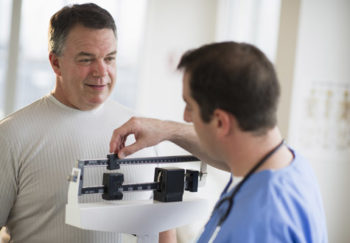The top reasons patients visit geriatrician Laurie Archbald-Pannone, MD, reflect a truth about the aging process: It’s not  something you can do alone. More than any other health concerns, Archbald finds herself helping patients deal with:
something you can do alone. More than any other health concerns, Archbald finds herself helping patients deal with:
- Polypharmacy, or the unintended accumulation of medicines that may interact with each other and require an analysis of what is truly needed, effective and safe
- An increase of falls, frailty or memory loss—symptoms we often don’t want to acknowledge and that loved ones may notice before we do
- Transitions in care to and from home, hospital, rehab facility or nursing home
- Caregiver burnout, a very real syndrome that can have damaging effects
Archbald points out that no one ages quickly; that is, we shouldn’t expect a sharp, quick decline upon hitting 60 or 70. Aging requires us each to pay more attention to our overall health and healthcare than ever before. And to talk about it.
Keep it Up
Make sure to continue critical preventive screenings for high blood pressure, high cholesterol, bone density, depression and cancer (especially breast and colon).
New to Think About
Screenings
You will need to introduce new screenings into your healthcare regimen, ones that focus on changes with age. You’ll want to talk with your doctor to see if you’re at risk for:
- Vascular disease
- Cognition impairment
- Functional decline
- Falls
Vaccinations
You’ll also need to talk to your doctor about the right shots, especially if you’re exposed to young children, who tend to be hotbeds of disease. These are critically important because, as we age, our ability to fight infection weakens. Talk to your doctor about getting vaccinated for:
- Influenza (flu) each year
- Pneumonia
- Tetanus
- Pertussis
- Shingles
Making Plans
Plan ahead. Talk with your loved ones about your wishes for your care in the event of an emergency. Decide who should be your medical power of attorney in case you’re not able to make your own decisions. It’s best to have these difficult discussions when things are going well.
Healthy Hacks by Decade
Take Charge of Your Health: Young Adults in Their 20s
What to Watch For
Dehydration
Drinking enough water matters now more than ever.
Archbald says that, with aging, “one tip of the scale even slightly can shift the whole balance into chaos and disrupt everything. At 30, you’ll quickly get over a day at Disney World,” she explains. “But not so much as we age- being dehydrated can have a much bigger impact because you have less reserves. Other examples? UTIs cause more confusion with age, and viral respiratory infections are harder to get past,” she says. “There’s just less give in the system.”
Exercise Redux
As you age, you still need to exercise, but differently. For example, you might find ways to get moving that have lower impact on your joints. Archbald generally recommends walking and swimming.
Now more than ever you should work on your body awareness. Archbald notes that “becoming aware of your own body is the first step, to stop and pay attention to how you move,” as an early intervention to avoid falls. She recommends exercise like tai chi, pilates or yoga that works on strengthening your core and enhancing balance and stability, as well as working with a physical therapist for walking help and fall prevention.
Memory Loss
“Keeping physically active is important but so is keeping mentally active and socially engaged,” says Archbald.
She says to consider three stages or types of memory loss when assessing your own or a loved one’s need for intervention:
-
Stage One: Normal Memory Loss
Ever found yourself forgetting the name of someone you only see about once a year? Don’t worry too much, says Archbald; decreases in our recall memory – your “rolodex,” as it were — are usually just signs of the normal aging process.”
What could be more of a potential problem, though, is forgetting the name of someone you see every day or a family member or forgetting how to go to places you usually frequent.
-
Stage Two: Mild Cognitive Impairment
Stage two is when you experience more significant memory troubles, but they don’t interfere with your daily activities. You’ll probably want to talk to your healthcare provider at this stage.
-
Stage Three: Dementia
Memory that does interfere with daily activities.
Memory loss, dementia, Alzheimer’s: These tend to be slow-moving and subtle in their progression. Addressing symptoms earlier rather than later can help you and your loved ones access helpful tools and resources for managing their effects.
Healthy Aging: A Final Word
Archbald’s take on aging: “Numbers don’t matter as much; function is the key!” It can be uncomfortable to acknowledge some of the early signs, but it’s important to be open and honest with your physician about what you’re experiencing, whether it’s forgetfulness, physical unsteadiness or weakness.
“That’s how we get so far in life — by ignoring a lot of things,” she acknowledges, “But as we age, we need to pay attention to our bodies to keep them healthy or to get help when needed.”
See a Geriatrician
Questions about aging or age-related health issues? We offer in-depth sessions with our doctors in sessions that last at least 30 minutes. Schedule a clinic visit today.
So, Archbald advises:
- Pay attention to your symptoms
- Talk with your provider about your concerns
- Consider seeing a geriatrician as well as or instead of your primary provider
- Stay active
- Stay engaged
- Stay well-hydrated


Great, informative website!
UVA also has expertise in Celiac and gluten sensitivity.
A through explanation about aging and health to all ages. Thank you so much